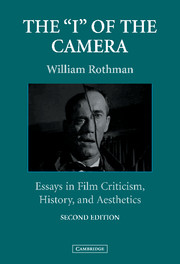Book contents
- Frontmatter
- Contents
- Foreword to the Second Edition
- Preface to the First Edition
- Acknowledgments
- Notes on the Essays
- The “I” of the camera
- 1 Hollywood Reconsidered: Reflections on the Classical American Cinema
- 2 D. W. Griffith and the Birth of the Movies
- 3 Judith of Bethulia
- 4 True Heart Griffith
- 5 The Ending of City Lights
- 6 The Goddess: Reflections on Melodrama East and West
- 7 Red Dust: The Erotic Screen Image
- 8 Virtue and Villainy in the Face of the Camera
- 9 Pathos and Transfiguration in the Face of the Camera: A Reading of Stella Dallas
- 10 Viewing the World in Black and White: Race and the Melodrama of the Unknown Woman
- 11 Howard Hawks and Bringing Up Baby
- 12 The Filmmaker in the Film: Octave and the Rules of Renoir's Game
- 13 Stagecoach and the Quest for Selfhood
- 14 To Have and Have Not Adapted a Film from a Novel
- 15 Hollywood and the Rise of Suburbia
- 16 Nobody's Perfect: Billy Wilder and the Postwar American Cinema
- 17 The River
- 18 Vertigo: The Unknown Woman in Hitchcock
- 19 North by Northwest: Hitchcock's Monument to the Hitchcock Film
- 20 The Villain in Hitchcock: “Does He Look Like a ‘Wrong One’ to You?”
- 21 Thoughts on Hitchcock's Authorship
- 22 Eternal Véritées: Cinema-Vérité and Classical Cinema
- 23 Visconti's Death in Venice
- 24 Alfred Guzzetti's Family Portrait Sittings
- 25 The Taste for Beauty: Eric Rohmer's Writings on Film
- 26 Tale of Winter: Philosophical Thought in the Films of Eric Rohmer
- 27 The “New Latin American Cinema”
- 28 Violence and Film
- 29 What Is American about American Film Study?
- Index
25 - The Taste for Beauty: Eric Rohmer's Writings on Film
Published online by Cambridge University Press: 05 June 2012
- Frontmatter
- Contents
- Foreword to the Second Edition
- Preface to the First Edition
- Acknowledgments
- Notes on the Essays
- The “I” of the camera
- 1 Hollywood Reconsidered: Reflections on the Classical American Cinema
- 2 D. W. Griffith and the Birth of the Movies
- 3 Judith of Bethulia
- 4 True Heart Griffith
- 5 The Ending of City Lights
- 6 The Goddess: Reflections on Melodrama East and West
- 7 Red Dust: The Erotic Screen Image
- 8 Virtue and Villainy in the Face of the Camera
- 9 Pathos and Transfiguration in the Face of the Camera: A Reading of Stella Dallas
- 10 Viewing the World in Black and White: Race and the Melodrama of the Unknown Woman
- 11 Howard Hawks and Bringing Up Baby
- 12 The Filmmaker in the Film: Octave and the Rules of Renoir's Game
- 13 Stagecoach and the Quest for Selfhood
- 14 To Have and Have Not Adapted a Film from a Novel
- 15 Hollywood and the Rise of Suburbia
- 16 Nobody's Perfect: Billy Wilder and the Postwar American Cinema
- 17 The River
- 18 Vertigo: The Unknown Woman in Hitchcock
- 19 North by Northwest: Hitchcock's Monument to the Hitchcock Film
- 20 The Villain in Hitchcock: “Does He Look Like a ‘Wrong One’ to You?”
- 21 Thoughts on Hitchcock's Authorship
- 22 Eternal Véritées: Cinema-Vérité and Classical Cinema
- 23 Visconti's Death in Venice
- 24 Alfred Guzzetti's Family Portrait Sittings
- 25 The Taste for Beauty: Eric Rohmer's Writings on Film
- 26 Tale of Winter: Philosophical Thought in the Films of Eric Rohmer
- 27 The “New Latin American Cinema”
- 28 Violence and Film
- 29 What Is American about American Film Study?
- Index
Summary
My films, you say, are literary: the things I say could be said in a novel. Yes, but what do I say? My characters' discourse is not necessarily my film's discourse. What I ‘say,’ I do not say with words. I do not say it with images either, all due respect to the partisans of pure cinema, which would ‘speak’ with images like a deaf-mute with his hands. After all, I do not say, I show. I show people who move and speak. That is all I know how to do; but that is my true subject.
Eric RohmerIn recent years, the advent of what is called “theory” in academic film study has led the field to turn away from the study of authorship in film, both from critical studies of individual authorships and from reflection on the implications of the fact of authorship in film, on the conditions that make authorship in this singular medium possible. Historically, this turning away occurred at the precise moment rigorous practices of film criticism, responsible to the films and to the critic's experience, were being instituted in the university, and film study was claiming – and beginning to earn – its rightful place in the university's intellectual life.
When the field turned away from “author criticism,” it turned away from other modes of criticism as well.
- Type
- Chapter
- Information
- The 'I' of the CameraEssays in Film Criticism, History, and Aesthetics, pp. 321 - 324Publisher: Cambridge University PressPrint publication year: 2003



